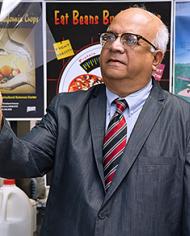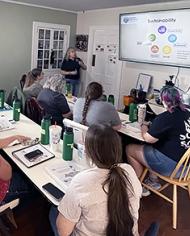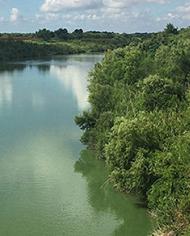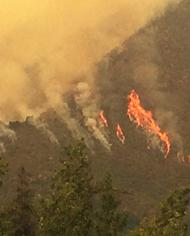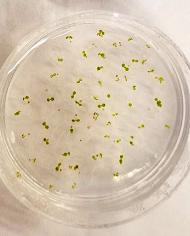Researcher develops technique to turn dairy waste products into bioplastic.
Tellus Articles
Researchers study the pathways of plant disease – and more – through the air.
ARS works with foreign scientists to prevent overseas diseases from spreading to the United States.
Researchers search for solutions to a deadly livestock virus that hides in plain sight.
This year marks the Agricultural Research Service's 70th anniversary.
Researchers train the next generation for the science of upheaval.
The ARS Three Sisters Project plants the seeds of agricultural science careers.
ARS researchers help students understand the world around them.
BlueSTEM, Oklahoma schools are partnering with ARS to cultivate curiosity
Like ‘mad cow,’ chronic wasting disease in deer currently has no cure.
See how ARS researchers are using insects to reduce the presence of Arundo, a fast-growing invasive grass.
A site in the middle of Missouri provides critical agricultural research on the national scale.
ARS researchers are downscaling climate data to improve modeling techniques.
ARS researchers are working on improving fish fillet quality.
ARS researchers look to improve diagnosis, testing, and vaccines for leptospirosis.
Researchers fine-tune taste buds and train discriminating palates.
A new workshop unites practice with research on the beneficial effects of fire.
The black soldier fly can reduce waste, serve as feed, and reduce emissions.
New uses for leftover agricultural products promise more revenue and less waste.
Before you know it, you might be fueling your car from a tree or bale of hay.
Advanced research and technology could squeeze every drop from feedstocks.
A new variety of wheat has shown modest improvements in the plant’s ability to withstand drought.
BRIDGEcereal quickly and accurately analyzes genomic data for cereal crops to improve crops.
Unique antibodies found in camels could be used to produce nanobodies that quickly block pathogens.
Adding catfish bone powder to breading mix increases profits, nutrition, and sustainability
Research and commerce use a two-pronged ‘fork’ approach to deal with invasive fish
The infamous spike protein doesn’t just help spread viruses – it can also be weaponized to stop them.
Small herbivores consider restoration seedlings a delicacy.
ARS joins research project to help organisms survive a drier world.
Scientists repurpose natural chemicals to kill disease-carrying insects.
New techniques use radiation to eliminate dangerous mosquitoes.
No cure yet, but treatment options for devastating ailment may be on the way.
Scientists are using a special camera to look into the eyes of each cow being processed through a feedlot.
Scientists discover new variant of bacteria that causes pinkeye.
ARS researchers are working on eradicating the cattle fever tick.
ARS researchers look to improve diagnostics tests and vaccines for this devastating disease.
ARS has launched a sweeping new initiative known as the Salmonella Grand Challenge.
ARS scientist borrows genetics approach to predict impact of changing climate conditions on crops.
In addition to brewing, Kernza can be used in many products as a substitute for traditional wheat.
Alligator weed works its way into Northern California. ARS researchers are seeking biocontrol agents.
New website delivers spectacular images and details of some of the world's bees.
ARS researchers are finding new, more sustainable uses for ethanol byproducts.
ARS researchers find answers in the unique biology of the ocean.
New online tool helps California farmers reduce the risks of climate change.
ARS-funded researchers are studying the role of nutrition in reducing health risks for preterm infants.
ARS researchers are working on strategies to protect herds from transmission of brucellosis.
ARS scientists explain how farmers can use nitrogen while both saving money and protecting the planet.
ARS scientists are using genetics to keep the Louisiana sugar industry vital.



